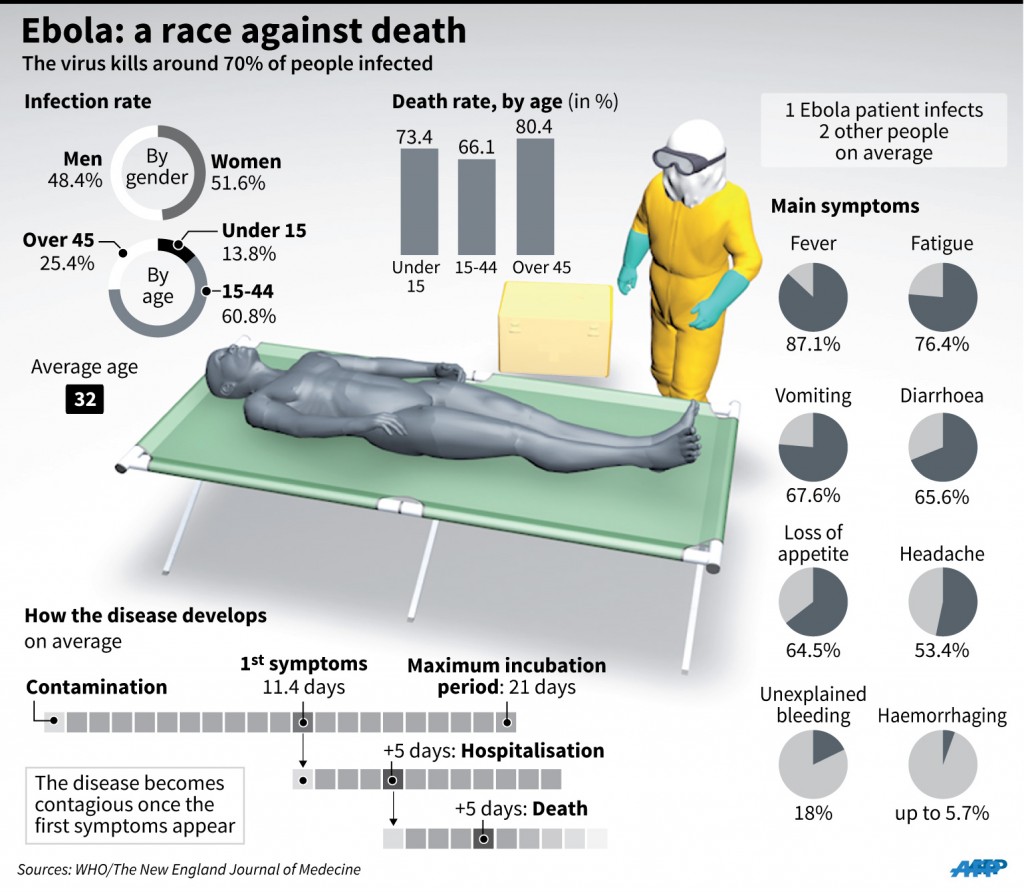Ebola: Simple methods of protection
PARIS — Preventing infection by the Ebola virus entails simple but rigorously-observed methods of barrier protection and monitoring for signs of ill-health, say experts.
These are recommendations by the World Health Organization (WHO) and the US Centers for Disease Control and Prevention (CDC):
Be alert for symptoms
Symptoms of Ebola include fever, headache, joint and muscle aches, weakness, diarrhea, vomiting, stomach pain, lack of appetite and in some cases bleeding.
“Transmission is through direct contact with bodily fluids of an infected person, or exposure to objects such as needles that have been contaminated with infected secretions,” said Stephan Monroe, deputy director of the CDC’s National Center for Emerging and Zoonotic Infectious Diseases.
“Ebola is not contagious until symptoms appear.” The incubation period for Ebola — meaning the time lapse between infection and the onset of symptoms — is up to 21 days.
Avoid contact with body fluids
The Ebola virus can be spread though mucus, semen, saliva, vomit, stool or blood but is not considered transmissible through airborne droplets, as flu can be, through sneezes and coughs.
Statistics show that most people who become infected with Ebola are those who live with and care for people who have the disease, which explains why health workers are especially vulnerable.
Caregivers in contact with Ebola patients wear a long-sleeved gown, mask, goggles and gloves.
The CDC also recommends routine hand-washing before and after contact with any patient who has a fever, as well as safe handling and disposal of needles and syringes.
Caution after recovery
In the current epidemic, the virus is fatal in about one in two recorded cases. Those who recover must exercise caution for nearly two months because they may still be infectious.
“Men who have recovered from the disease can still transmit the virus through their semen for up to seven weeks after recovery from illness,” said the WHO.
Care with funeral rites
Ebola has also spread to people who touched the bodies of people who had died from the virus, such as during funeral preparations and burial ceremonies.
“People who have died from Ebola should be promptly and safely buried,” said the WHO.
Avoid bushmeat
Ebola gets into the human population after people come in contact with the blood, organs or bodily fluids of infected animals.
Fruit bats are Ebola’s natural host. The virus can be transmitted to other species, which in parts of forested tropical Africa, are “bushmeat,” a source of food.
“In Africa, infection has been documented through the handling of infected chimpanzees, gorillas, fruit bats, monkeys, forest antelope and porcupines found ill or dead or in the rainforest,” according to the WHO, which says people should avoid eating or handling raw bushmeat.
RELATED STORIES
There’ll be no stopping Ebola spread in PH, says expert
World takes precautions vs deadly Ebola outbreak















